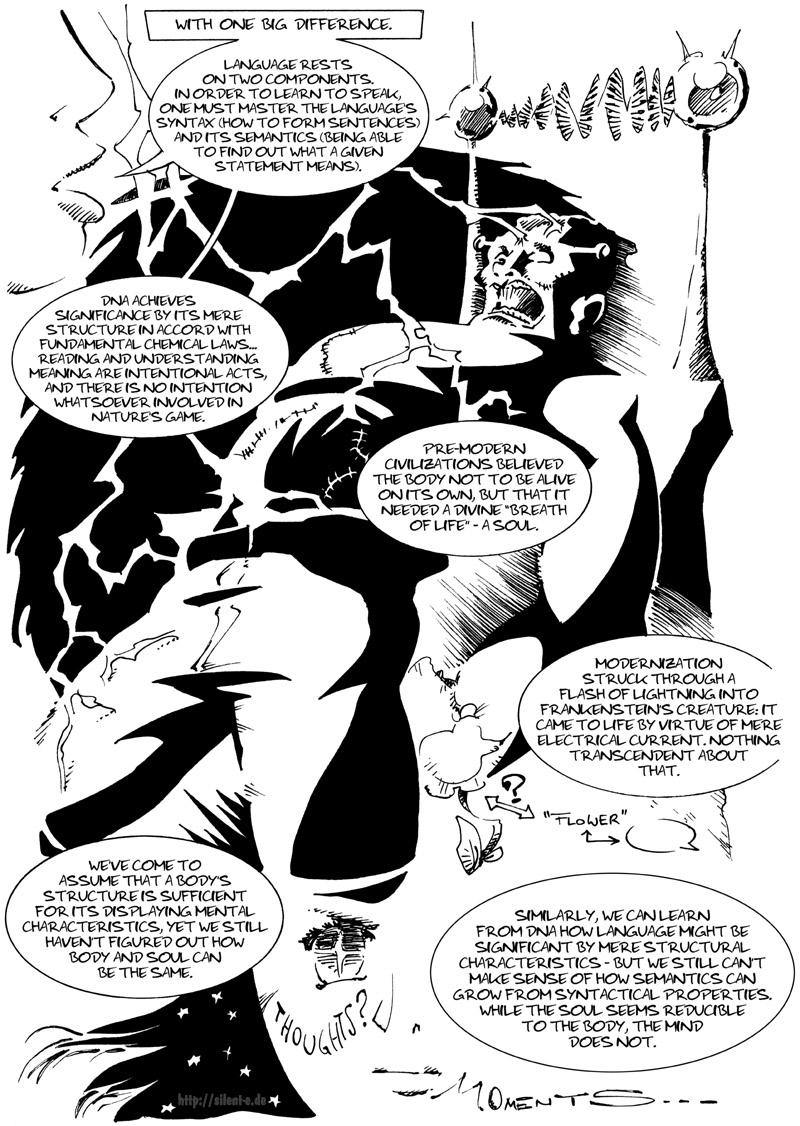

Author notes
Chapter 3 Prologue 2
Abt_Nihil onI apologize that this page turned out so text-heavy, and pretty abstract too, but I figured there was no way getting around it.
Actually, now that I'm reading it, it DOES sound pretty much like the introductory chapter to a book I always wanted to write ;-)
REPLIES:
DAJB, mmm bacon0: Thanks!
chuckwheel: Thanks a lot, and welcome aboard!
Jabali: Good to know :-)
zeropointone: Thanks! I believe some questions can only be adressed by posing them in the complex way their subject matter suggests… I tried to not make it too complex, but when posting this page I'd already assumed that I failed to some extent. So if you don't understand it the second or third time you read it, just wait for the next pages… or just google what you don't understand, or simply ask me :-)
Fitz: You don't expect me to explain God's intentions to you, do you? ;-D But there are some things I can reply to, and about which I have a firm opinion. First off: Me saying there's no intention involved on nature's part doesn't mean everything's completely random and self-sufficient. When I say that nature is not intentional, I just mean something like: nature doesn't have a mind / psychological laws don't apply to nature / applying them to natural phenomena would be a faulty mixing of distinct categories. I can't see how from these statements alone the claim that every creature is random and self-sufficient would follow. Or maybe it depends on your understanding of "random"?
My understanding is this: In fact, no creature is random, but rather determined by natural laws (like those of evolution), and these natural laws are completely un-intentional (and I obviously take "random" and "determined" as negating each other). And of course no creature is self-sufficient: even those that don't mate still depend on energy supply (heat, air etc.) - I wouldn't call that self-sufficient in the least. And as you said, most higher organisms even need other creatures to produce offspring. And still other organisms need fellow creatures not only to mate, but to develop themselves (social creatures like higher primates, including ourselves, whose brains only develop when tended to by other individuals of the same species, or who depend on culturally mediated information, but also lower organisms who form "states", like ants, or even lower "cultures" of bacteria and such…). I think this is the part we both agree on, but somehow you think this is all inconsistent with my claim that nature is unintentional.
The basic assumption is this: You’ve got four different kinds of protein, and you’ve got a near-unlimited supply of each. You put it all in a giant cocktail-mixer, shake it and stir it, and then spill it over the earth. You look if the proteins have formed DNA (which they are chemically disposed to do – and chemical laws are, you guessed it, unintentional). If they didn’t: Put it back into the mixer, shake it and stir it again, spill it again. As many times as you like (because time is near-unlimited too). Sometimes, meaningful DNA (from which surviving organisms grow – again, by mere chemical laws, but this time combined with physical laws and the given environment) will result. If so, you do NOT put it back into your mixer. The rest will be shaken and stirred UNTIL something meaningful comes out of it (unless time comes to an end first). At first, surviving organisms will be very simple. But once you’ve got a basic organism, the only parts of their DNA that continue to be shaken and stirred are those that determine their features. Why? Because mutation is rare, and the probability that all the essential elements in its DNA are changed by spontaneous mutation is neglectable. Lucky improvement of features by mutation heightens chances of survival, unlucky degradation lessens them. Shake and stir the unlucky ones, shake and stir. And poof! A whole lot of creatures, varying in their features, and all the unlucky ones die. That answers the question why the surviving ones are so ingeniously built. And it’s all… you guessed it, unintentional. A matter of chance? Yes, but guided by deterministic laws in conjunction with the given environment. Random? Only if you think that conditions of survival are random. On a human scale, they appear to be. But they’re all determined by natural laws.
Are there alternative ways of explaining our current state of evolution? Yes there are, but they are in no way superior. Let’s consider the one suggested by your questions: What would nature's having a mind explain? Well, it would explain why creatures seem to exhibit features of "intelligent design". But it's really just a transposition: In order to explain intentional phenomena on a lower level (creatures) you posit an intentional phenomenon on a higher level (nature). You just change the level at which you'd need an explanation - and you certainly need a basic explanation for why there's intentionality in the first place. "Intelligent design" won't answer that question, because that theory simply posits intentionality. But if you posit intentionality at a higher level, why not just posit it at the lower level? Clearly, from the standpoint of which explanation is better, it doesn't make any difference at which level intentionality is introduced.
And the good thing about the theory of evolution is: It’s compatible with attempts to explain why intentionality can be introduced at a lower level – as features of physical phenomena. And that’s exactly what this page is about.
Whew!
Lastly, regarding your question if there's someone having fun watching romance and tragedy: Well… you and me and a whole lot of others, obviously ;-) But that's not the evolutionary "intent", so to speak (- the fact that nature is unintentional doesn't mean that intentional lingo ain't a good metaphor for it, eh?). The events that underlie romance and tragedy and all that good stuff do serve an evolutionary purpose - but that's the assumption that goes naturally with the adoption of the evolutionary theory. It's not meant to prompt you to adopt this theory in the first place. And when I say "the events that underlie…" I mean: The fact that we perceive these events as romance and tragedy only hints at our capability to understand intentionality. But never forget - many other creatures don't. Some creatures are funny to us, but they certainly don't get the joke themselves (of course it isn't exactly right to think that we're the only creatures capable of humor… it's a gradual thing, as always is with evolution - just a hint: Humor is closely knit to phenomena as "playing" where playing means: not being serious, trying things out. That sort of phenomenon is exhibited by many higher organisms).
JNP: Yup, I guess I should credit Fitz as a contributor here :-) And thank YOU for reading all that stuff!
Fitz (again): Just to clear up some things:
(1) I didn't wanna insinuate you'd be a proponent of the intelligent design theory… I just thought it's the theory that's the most straightforward answer to your questions ("Why does everything look as if it was so intelligently designed?" - "Well, because it IS!" :-P)
(2) Maybe there's a misunderstanding involved in my use of the word "intentional": If you take it just to mean "seeming to have a purpose", I'd agree that by that understanding most things would seem intentional. But then I'd say, well, are the phenomena themselves responsible for that, or are WE because we understand them that way? I mean: A seems to B as if C. If A is not C, it could be B's faulty perception. But the important thing here is: I take "intentional" to mean "having an intention", which is: a psychological "intentional" state which presupposes the having of a mind. And clearly (at least to me) there aren't many things which have minds besides human beings. And another important thing: Even if they had, what would that prove? It clearly couldn't be that at one time there was a skunk that didn't stink, and then it intended to stink, and magically the next generation did? It's just that mutations resulted in all sorts of creatures, and those which were unsuccessful aren't with us today. I said something about the other option - referring to a creator - in my previous reply.
(3) And of course, taking all these things as metaphors is absolutely fine with me (for instance, when you suggest I should take whatever "urge" as a "plot device") - a good metaphor is supposed to be more illumating than a straightforward description anyway. But if you want to get at a literal truth… well, then I think you should abandon the hope that there's a mind behind all the miraculous things that surround us. Not because "God is dead" or some such pretentious nonsense, but because a mind is something which is to be defined in a pretty narrow sense - namely as belonging to human beings, and (to a lesser extent) to similarly high organisms.


Comments
Please login to comment.
Login or Register${ comment.author }} at
${ comment.author }} at